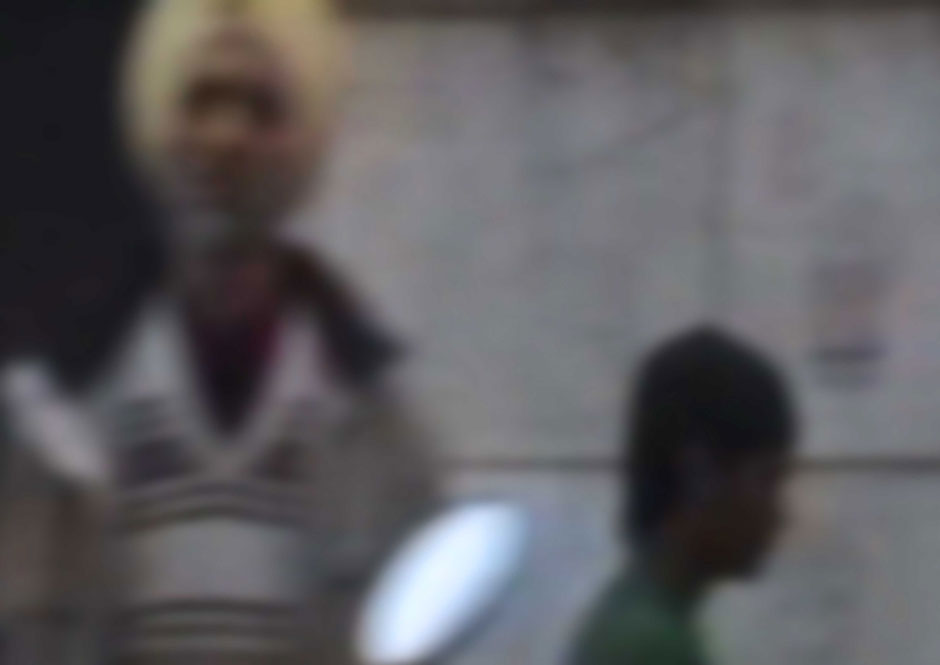Exhibition
in Eschlikon / Switzerland
- © Ernst Thoma
The extensive video-installation by Ernst Thoma dates back to his journey to India in 2009. Two rather unusual topics for Europeans are moulded in one piece: the handling with time and the intense abundance of colours.
The filming was done in an urban environment – mainly in Old Delhi. The original films contain therefore an extraordinary dense soundtrack put up by fragments of words, shouts, honks and diverse sounds of various means of transport. The audio part of the installation was completely redone with new material, including pieces of the original sound. This results in the preservation of its density, but also leads away from being clearly identified.
The large installation in the hay barn comprises several projection frames and monitors. Three of the big frames and six monitors are hanging from the ceiling. The frames are transparent and can be viewed from both sides. The mix of frames and monitors is a considerable part of the spatial dramaturgy since their different light and colour intensity effects an additional scaling of depth.
One of the most striking things is the slow motion and the overlapping of images. Best seen when a motorbike runs from one side across the picture and simultaneously but not identically crosses several frames. It just looks like the driver is hitting the break and continues in slow motion. Real time speed is decreased and the frames expose simultaneity, creating a surrealistic picture.
The Indian concept of time fundamentally differs in this regard from the Western understanding of time being a linear function. Characterised by Hinduism and its related reincarnation the Indians relate to time in a bigger frame. Seconds, minutes and hours don’t count, but the flow of life does. Life is not finite but a cycle. This facilitates the concept of time tremendously. This concept of time is closely connected with the belief in Karma where every action and thought causes Karma and leads to further involvements in the earthly world. For Hindus and Buddhists it is eminently important not to cause additional Karma in order to eventually break through the cycle of eternal reincarnation. From that perspective, everyone receives multiple, even innumerable possibilities to retire from their cycle of reincarnations – or to go through it again.
Ernst Thoma lives and works in Stein am Rhein. He graduated from the F+F Schule für Kunst und Mediendesign, Zurich and from the Elektronisches Studio der Musik-Akademie Basel. His work has been included in many exhibitions, among others at the Kunstraum Kreuzlingen, Internationalen Lichttage Winterthur, Zeppelin Museum Friedrichshafen, Kunsthalle Winterthur, Lichtinsel Kassel, Kunstmuseum Singen and Kunstmuseum Kanton Thurgau. His art work “Klänge der Nacht” was part oft he Expo 02 in the BlindeKuh in Murten.
Opening hours Wed-Fri 2 – 6 pm, Sat 11 am – 4 pm, and by appointment
Die Video-Installation von Ernst Thoma geht auf eine Indienreise von 2009 zurück und bindet zwei für Europäer eher ungewohnte Themenbereiche ein: den Umgang mit der Zeit und die alles durchdringende Farbigkeit. Die Installation im Heustall ist raumgreifend und bestehend aus mehreren Frames und Monitoren.
Die Aufnahmen zu dieser Arbeit entstanden alle in einem städtischen Umfeld, hauptsächlich in Old Delhi. Die Originalfilme enthalten dementsprechend einen ausserordentlich dichten Soundtrack, der vor allem aus Wortfetzen, Rufen, Hupen und den vielfältigen Geräuschen verschiedenster Verkehrsmittel besteht. Der Audioteil der Installation wurde von Thoma mit komplett neuem Material angelegt, wobei in ihm bruchstückhaft der Originalton enthalten blieb.
Dem Betrachter fallen die verringerte Geschwindigkeit und die sich überschneidenden Bilder sogleich auf. Am Besten sichtbar in der Sequenz, in der ein Motorrad quer durch das Bild fährt und dabei mehrere Bildrahmen durchläuft. Ein surrealer Zustand, als ob jemand plötzlich die Bremse drückt und gleichzeitig in Zeitlupe weiterfährt.
Der indische Zeitbegriff unterscheidet sich in diesem Punkt fundamental vom westlichen Verständnis der linearen Zeit. Geprägt vom Hinduismus und der damit verbundenen Wiedergeburt begreifen die Inder die Zeit in einem grösseren Rahmen. Es geht nicht um Sekunden, Minuten oder Stunden, sondern eher um den Fluss des Lebens. Das Leben ist nicht endlich, sondern ein Kreislauf. Das relativiert den Zeitbegriff ungemein. Denn dieser Zeitbegriff ist eng mit dem Glauben an das Karma verbunden. Alles Handeln und Denken bewirkt Karma und führt somit zu weiteren Verstrickungen in der Welt. Für Hindus und Buddhisten ist es deshalb erstrebenswert, kein weiteres Karma zu erzeugen um diesen Kreislauf der ewigen Wiedergeburt zu durchbrechen. So gesehen, erhält jeder mehrere, ja unzählige Möglichkeiten aus diesem Kreislauf der Wiedergeburten auszuscheiden – oder das Gleiche nochmals zu durchleben.
Ernst Thoma lebt und arbeitet in Stein am Rhein. Seine Studien hat er an der F+F Schule für Kunst und Mediendesign, Zürich und anschliessend am elektronischen Studio der Musik-Akademie Basel abgeschlossen. Thomas Arbeiten waren an diversen Ausstellungen, wie zum Beispiel im Kunstraum Kreuzlingen, an den Internationalen Lichttagen Winterthur, im Zeppelin Museum Friedrichshafen, in der Kunsthalle Winterthur, in der Lichtinsel Kassel, im Kunstmuseum Singen und im Kunstmuseum des Kantons Thurgau ausgestellt. An der Expo 02 war er mit dem Geräuschhörspiel ‘Klänge der Nacht’ im Pavillon Blindekuh in Murten beteiligt.
Öffnungszeiten Mi-Fr 14 – 18 Uhr, Sa 11 – 16 Uhr, und nach Vereinbarung
Location:
widmertheodoridis
Fallackerstrasse 6
8360 Eschlikon
Switzerland


